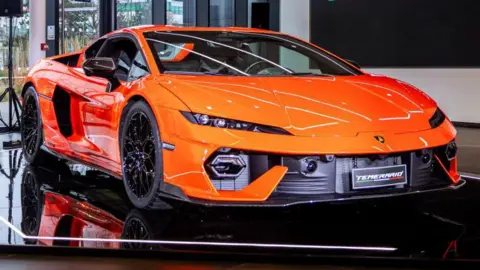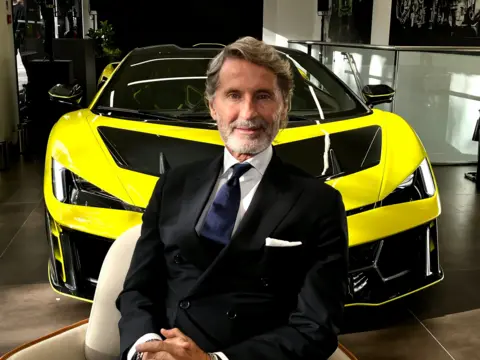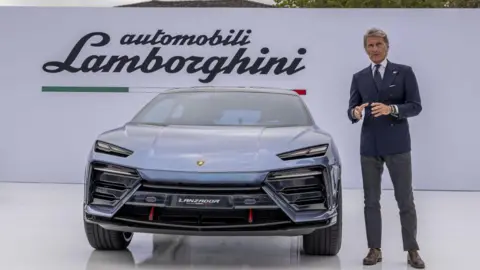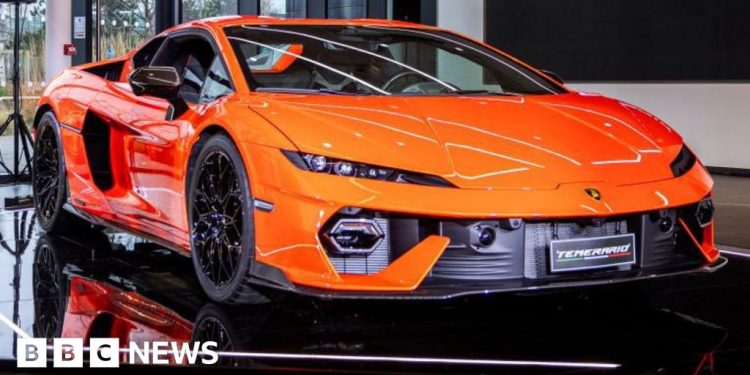Theo LeggettInternational business correspondent
 Getty
GettyThe Lamborghini boss said his customers still want the “sound and emotion” of internal combustion engines, and the company will use them in its cars for at least the next decade.
Speaking to the BBC at the Italian supercar maker’s London showroom, chief executive Stephan Winkelmann said enthusiasm for electric cars was waning, creating an opportunity to focus instead on hybrid power.
Lamborghini will decide next month whether a long-planned new model, the Lanzador, will be fully electric or just a plug-in hybrid, he said.
Mr Winkelmann insisted the company was socially responsible, but added that as a low-volume manufacturer its actions would have limited impact on the environment.
Lamborghini is a luxury brand ultimately owned by the Volkswagen Group. There are currently three main models.
The Temerario and Revuelto are supercars. Both are plug-in hybrids, combining powerful gasoline engines with electric motors. They can drive in all-electric mode, but only for very short distances.
The Urus is a luxury SUV, currently available as a plug-in hybrid and as a conventional gasoline car. Less exotic and certainly less ostentatious than supercars, it nevertheless represents more than half of the company’s sales.
There is also a limited edition “super sports” car: the Fenomeno, which has a top speed of over 340 km/h. Only 30 will be built, each costing at least €3m (£2.6m) before tax.
Two years ago, Lamborghini announced plans to offer a fully electric successor to the Urus, which would be available from 2029. However, the project was recently abandoned, with the electric model now not expected until 2035.
He also planned to make an all-new battery-powered grand tourer (GT), which would be called Lanzador. However, the future of this project is also deeply uncertain.

“We still have to decide whether we go fully electric, as we did a few years ago, or whether in the new environment it is also appropriate to go with a plug-in hybrid,” Winkelmann said.
The new environment he’s referring to is a decline in high-end buyer interest in electric cars.
“Today, enthusiasm for electric cars is waning,” he explained. “We see a huge opportunity to stay with internal combustion engines and a battery system much longer than expected.”
Continuing to use internal combustion engines for another 10 years would, he said, be “paramount to the success of the company.” Customers, he insisted, still wanted the sound and fury of a conventional engine.
“It’s something they want, they still want the sound and emotion of an internal combustion engine,” he said.
It’s an approach that contrasts with that of Lamborghini’s main Italian rival, Ferrari, which is pursuing its own plans for a first fully electric car.
The aptly named Elettrica is expected to be unveiled next year, although the company showed off some key components at its capital markets day earlier this month.
It will be sold alongside conventional and hybrid models.
Ferrari chief executive Benedetto Vigna said the brand would have driving characteristics “unique in the hearts, in the souls of our customers.”
 Getty Images
Getty ImagesMr Winkelmann insisted his own company was not ignoring the constant pressure to reduce emissions.
“We sell 10,000 cars in a world that produces 80 million cars a year, so our impact in terms of CO2 emissions is not that big,” he said.
“Of course we are socially responsible, but that doesn’t really make a difference.”
The sale of new petrol and diesel cars, including plug-in hybrid cars, is set to be banned in the EU and UK from 2035.
However, within the EU, there has been intense lobbying by some manufacturers for the transition to electric cars to be given more time, in order to “recognize current industrial and geopolitical realities”.
If this were the case, internal combustion engines could remain on the market beyond the current deadline.
At the same time, UK rules provide an exemption for “low volume” manufacturers who register fewer than 2,500 new cars each year.
That would currently cover Lamborghini, which sold just 795 cars here last year.










